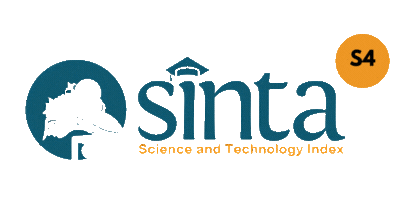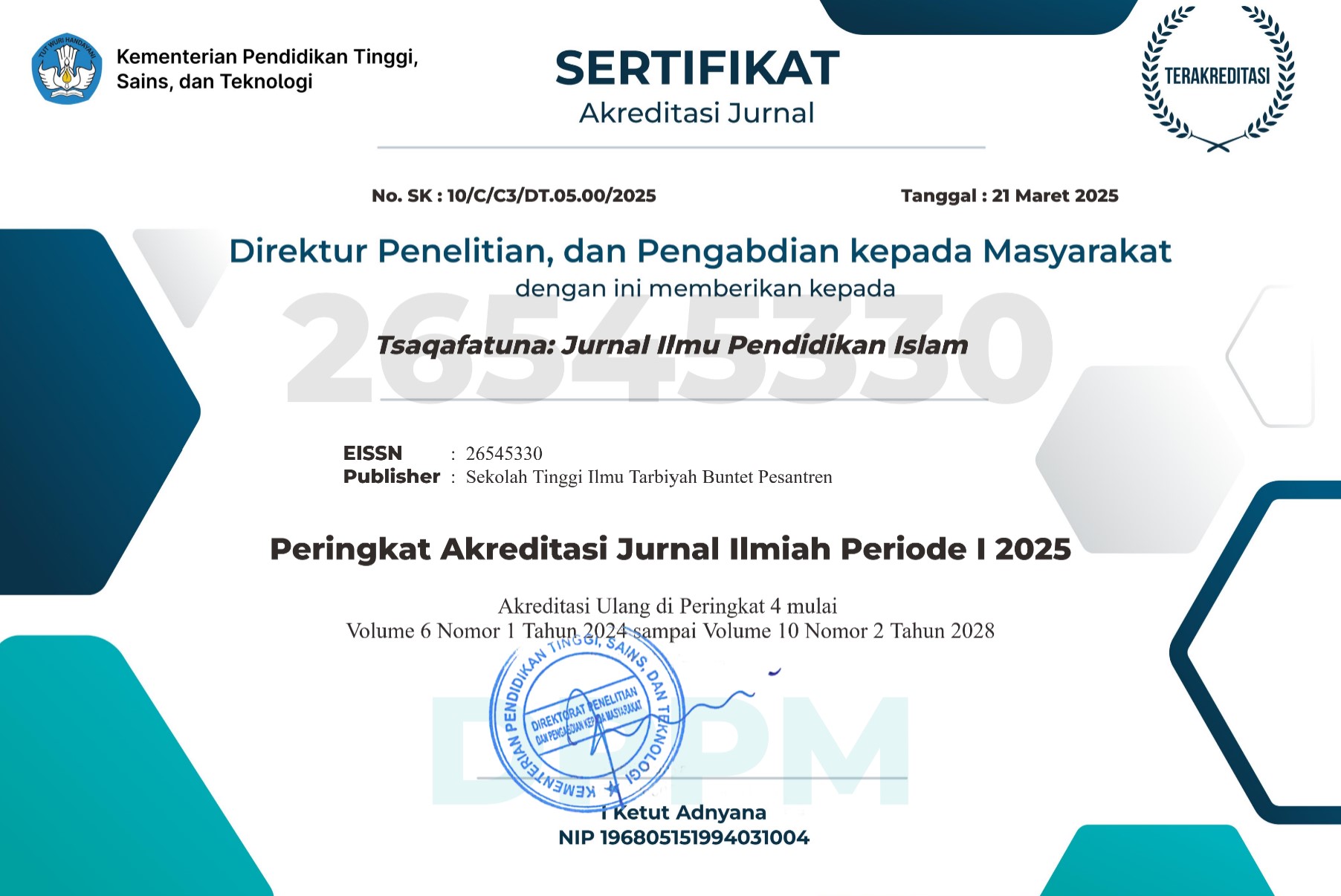Implementasi Filosofi “Menumbuhkan Padi” sebagai Media Pembentukan Kepemimpinan Siswa dalam Perspektif Ki Hajar Dewantara di SMP Negri 1 Jalaksana Kabupaten Kuningan
DOI:
https://doi.org/10.54213/tsaqafatuna.v7i2.685Keywords:
Educational Philosophy, Growing Rice, Student Leadership, Ki Hajar DewantaraAbstract
This study aims to describe the implementation of the “growing rice” philosophy in shaping student leadership character at SMP Negeri 1 Jalaksana. This concept refers to the thoughts of Ki Hajar Dewantara, who emphasized education as an effort to guide students’ natural potential to develop holistically, encompassing cognitive, affective, and psychomotor aspects. The research employed a qualitative method with an ethnographic approach conducted over one week, involving observations and in-depth interviews with the principal, teachers, and students. Primary data were obtained from observations and interviews, while secondary data were derived from relevant literature, including books and scholarly articles. The findings reveal that the implementation of the “growing rice” philosophy is carried out in three stages: pre-growing, during growth, and post-growing. At the pre-growing stage, teachers prepared learning strategies aligned with the Merdeka Curriculum, including project-based learning, differentiated instruction, socio-emotional competency development, reflective practices, and positive discipline. During the growth stage, activities were conducted through intracurricular, extracurricular, and co-curricular programs that provided students with opportunities to create, collaborate, and participate in decision-making. The post-growing stage encompassed “harvesting,” reflected in the enhancement of students’ leadership skills such as effective communication, teamwork, conflict management, and decision-making, along with semester-based evaluations to monitor the development of leadership character. In conclusion, the implementation of the “growing rice” philosophy fosters students’ leadership character, creating an inclusive, cooperative, and positive school culture. Thus, Ki Hajar Dewantara’s educational philosophy remains relevant in supporting the goals of the Merdeka Curriculum to shape a generation that is intelligent, of strong character, and prepared to face future challenges.
Downloads
References
Acim, S. A. (2023). Systematic, substantive and functional comparison between the holy Qur’an and Pancasila. HTS Teologiese Studies / Theological Studies, 79(2). https://doi.org/10.4102/hts.v79i2.8154
Al-istiqlali, S. D. R., & Jamilah, S. (2024). Konsep dan Aplikasi Pemikiran Ki Hajar Dewantara dalam Pendidikan. Jurnal Teknologi Pendidikan, 13(2). https://doi.org/https://doi.org/10.32832/tek.pend.v13i2
Amanda, A. F., & Wulandari, Y. (2022). Literasi Digital: Dampak dan Tantangan dalam Pembelajaran Bahasa. Jurnal Tonggak Pendidikan …. https://online-journal.unja.ac.id/jtpd/article/view/22873
Anton, A., Luthfi, I. A. A., Ilham, F. M., & Maulidan, P. (2024). Kegiatan Ekstrakurikuler Pendidikan Agama Islam Di Sekolah. Jurnal Intelek Dan Cendikiawan Nusantara, 1(5), 8020–8030.
Dewey, J. (1974). John Dewey on education: Selected writings.
Dikawati, R., & Surakarta, K. (2019). Tinjauan Filosofis Budaya Agraris Reresik Lak : Konservasi Air dalam Praktik Pertanian Dusun. Jantra, 14(1), 27–36. https://doi.org/https://doi.org/10.52829/jantra.v14i1.80
Freire, P. (2014). Educação como prática da liberdade. Editora Paz e terra.
Haryati, A. M. S., Sudirman, I. K., & ... (2023). Pelaksanaan pendidikan karakater pada Mata Pelajaran PPKn di SD melalui model pembelajaran berbasis nilai. Jurnal Ilmiah …. https://ejournal.mandalanursa.org/index.php/JIME/article/view/5052
Ihsan, M., & Mahrus, E. (2023). Konten Materi Aqidah Karya Haji Muhammad Saleh pada Mata Pelajaran Aqidah Akhlak di Madrasah Tsanawiyah (Telaah Kitab Syarah Aqidatul Al-Awam). Indo-MathEdu Intellectuals Journal. https://ejournal.indo-intellectual.id/index.php/imeij/article/view/388
Irwan, M., Anggreni, A., Sunita, J., & Suhdi, H. (2022). Life Skills Education Through Non-Formal Education For People With Physical Disabilities. SPEKTRUM: Jurnal Pendidikan Luar Sekolah (PLS), 10(2), 235–242.
Kusuma, Y. Y., Sumianto, S., & ... (2023). Pengembangan Model Pembelajaran Berdiferensiasi Berbasis Nilai Karakter dalam Kearifan Lokal pada perspektif Pendidikan Global di Sekolah Dasar. Jurnal …. http://journal.universitaspahlawan.ac.id/index.php/jpdk/article/view/11446
Made, N., Cahyani, M., Wayan, N., & Damayanti, E. (2022). Unsur-Unsur Dan Filosofis Pendidikan. Pedalitra: Prosiding Pedagogi, Lingustik, Dan Sastra, 2(Pedalitra II).
Mardikaningsih, R. (2024). Studi tentang Pengalaman Mahasiswa: Peran Kegiatan Ekstrakurikuler dan Keterlibatan Mahasiswa. Nala, 4(1), 1–14.
Minawati, A. A., Suryana, Y., & Elan, E. (2019). Penanaman Nilai-Nilai Sila III Pancasila Melalui Penerapan Model Pembelajaran Berbasis Masalah untuk Membangun Karakter Siswa Sekolah Dasar. PEDADIDAKTIKA: Jurnal Ilmiah …. https://ejournal.upi.edu/index.php/pedadidaktika/article/view/12947
Montessori, M. (2002). El método montessori. COMPAÑIA NUEVA YORK.
Mukhlison, M., & Arif, M. F. (2023). Pendidikan Life Skill dan Kemandirian Santri Dalem Pondok Pesantren Haji Ya’qub Lirboyo Kediri. Multidisciplinary Journal of Education …. https://sunanbonang.org/index.php/mjeec/article/view/62
Munawar, A. (2023). Peran Kepemimpinan Kepala Sekolah dalam Mengembangkan Budaya Membaca Al-Qur’an di SMA Negeri 2 Dompu. Jurnal Pendidikan Dan Pembelajaran Indonesia (JPPI), 3(2). https://doi.org/10.53299/jppi.v3i2.328
Nita, V., & Fuadi, A. (2023). Konsep Guru Dalam Pandangan Ki Hajar Dewantara Dan Dari Perspektif Pendidikan Islam. 4(1), 170–180. https://doi.org/https://doi.org/10.51178/jesa.v4i1.1156
Norjanah, H., & Agustina, L. (2025). Paradigma Ki Hajar Dewantara terhadap Pengembangan Kurikulum 2013 dan Kurikulum Merdeka. Jurnal Psikososial Dan Pendidikan, 1(1), 14–32.
Pratiwi, W. O., Nurwahidin, M., & Sudjarwo. (2022). Menelaah Tujuan Pendidikan Indonesia dari Perspektif Filsafat Barat dan Islam: Study Komparatfi Pemikiran Plato dan Al-Ghazali. Jurnal Pendidikan Dasar Dan Sosial Humaniora, 2(1).
Purwanta, H. (2025). Pedagogical Model Innovation Based on Ki Hajar Dewantara ’ s Among System for History Learning in the Merdeka Curriculum. Educational Process: International Journal, 14. https://doi.org/https://doi.org/10.22521/edupij.2025.14.39
Rofiah, H. A., & Muharom, F. (2025). Ki Hajar Dewantara Among System and Its Relevance to Islamic Education. Al-Afkar Journal For Islamic Studies, 8(1), 348–359. https://doi.org/10.31943/afkarjournal.v8i1.1019.Ki
Supartinah, S., & Adi, B. S. (2018). Model pembelajaran berbasis balanced literacy approach bermuatan nilai-nilai karakter untuk pembelajaran literasi dasar di kelas awal. Jurnal Penelitian Ilmu Pendidikan. https://journal.uny.ac.id/index.php/jpip/article/view/23793
Suprapti, W. (2019). Modul Berfikir Kreatif dalam Pelayanan Pelatihan Kepemimpinan Pengawas. LAN Republik Indonesia.
Suryandari, K. (2023). Pembelajaran Tematik di Sekolah Dasar dalam Pandangan Teori Perenialisme Plato. Jurnal Papeda: Jurnal Publikasi Pendidikan Dasar, 5(1). https://doi.org/10.36232/jurnalpendidikandasar.v5i1.3104
Syarifuddin, D. (2020). Nilai budaya tanam padi sebagai daya tarik wisata. Media Wisata, 18(2), 263–274. https://doi.org/https://doi.org/10.36276/mws.v18i2.105
Yanti, N. A., & Masnawati, E. (2024). Penerapan Teori Pembelajaran Kognitif dalam Optimalisasi Prestasi Akademik Mata Pelajaran Akidah Akhlak di MTs Darussalam Sidodadi, Taman Sidoarjo. Journal Creativity. https://creativity.masmubata-bata.com/index.php/creativity/article/view/21











